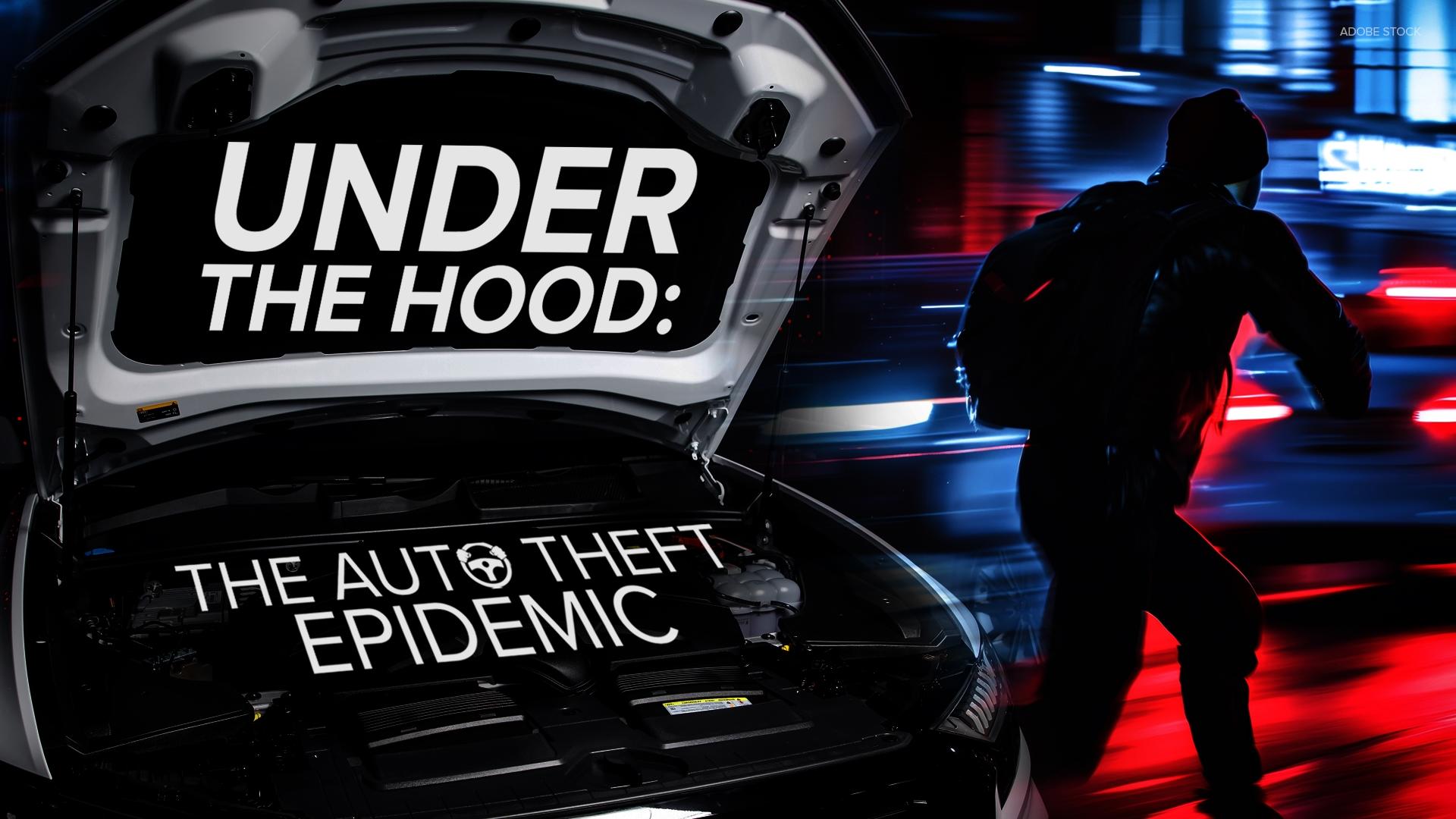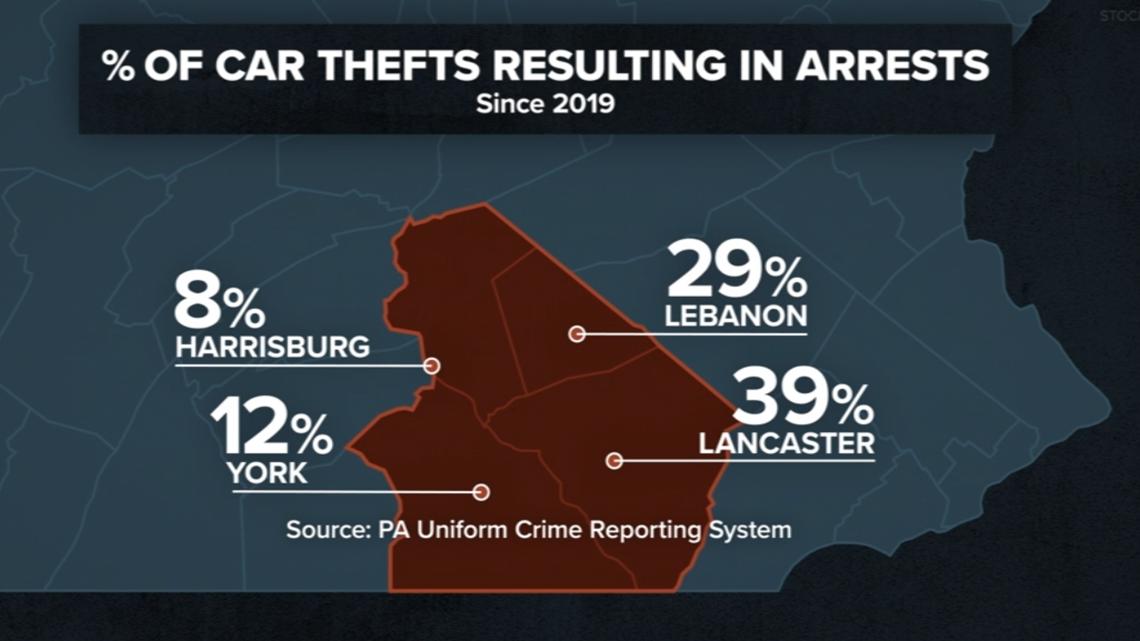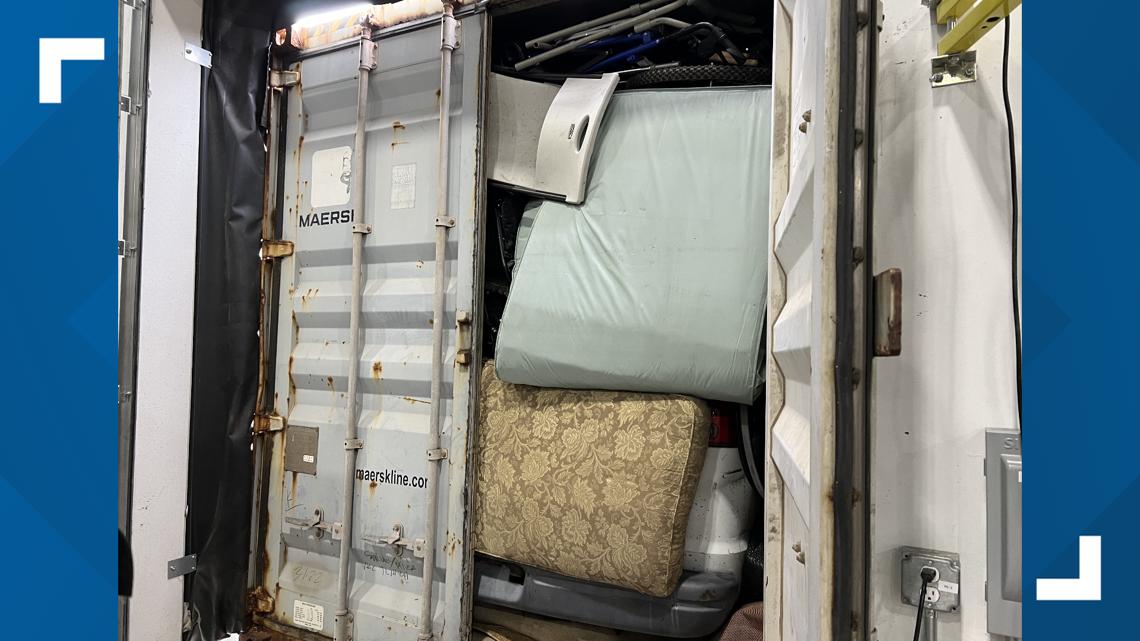Under the Hood | An inside look at Pennsylvania's auto theft epidemic
Vehicle thefts continue to rise in central Pennsylvania and across the country. Experts say we're all paying the price.

Across our region, and across the country, vehicle thefts have soared over the last several years.
There are several factors at play, from advancing technology to law enforcement staffing struggles.
Experts say it's a problem we are all paying the price for. That's why FOX43 is going "under the hood" and diving into the auto theft epidemic in south central Pennsylvania.
UNDER THE HOOD How it happens
“I never, ever once thought my car would be stolen," Lancaster resident Brian Calabrese told FOX43.
But that's exactly what happened to him earlier this year.
“The car was stolen in under four minutes," he explained.
Calabrese's 2024 Nissan GTR, valued at $150,000, was snatched right from his apartment garage in the middle of the night.
“They did not have my keys. They did not break the glass," Calabrese recounted. "It was a team of individuals that stole the car. From my perspective, it looked like they had cased the place.”
It’s a wild story becoming all too common across central Pennsylvania, and across America.
“We had been on a pretty good winning streak, if you want to call it that, up until a few years ago," said Steven Wheeler, executive director of the Pennsylvania Auto Theft Prevention Authority.
The Authority was created by the General Assembly in 1994. According to the organization's website, it's made up of a statewide network of law enforcement grantees including nearly 100 police officers, state troopers, detectives, prosecutors, paralegals, and support staff.
Wheeler has more than 30 years of law enforcement experience under his own belt.
“[Then] we got hit with Covid and the lockdowns, people not being out and about, cars sitting for extended periods of time," he continued. "[That's when] things started to happen.”
In the last several years, experts say auto theft has become an epidemic.
“There used to be an idea, ‘Oh, car theft is joyriding, it’s some teenagers that took your car cause it had the keys in it and they went for a ride and left it once it ran out of gas or whatever,’" said Wheeler. "Not the case anymore.”
In Brian's case, it was a group of professionals who stole his car. As has become common with auto theft, the thieves were able to steal the signal from a key fob inside his apartment.
“They were definitely professionals," Calabrese said. "I spoke with Nissan, Nissan tried to send my car a new software signal so they could track it and it didn’t work.”
These professional criminals are going well beyond just stealing from private vehicle owners.
“Car theft tends to be sophisticated, it tends to be organized," said Wheeler. "We see dealerships that are getting hit."
Morgan Automotive in Penn Township, Lancaster County, is one of those dealerships.
“These guys will stop at almost nothing," said owner, Doug Morgan. "They have no fear whatsoever.”
In the span of 18 months, Morgan has had five cars stolen off his lots.
Three cars were eventually recovered but the crimes still totaled nearly a half million dollar hit to the business.
“It’s time, it’s personal property, it’s the cars themselves," Morgan explained. "If we do get them recovered, now we have to sell them as recovered theft cars. They’re usually damaged.”
Morgan says he and other local dealerships are aware that criminal groups are in Lancaster County regularly looking for vehicles to steal. He says they're also known to fly drones over lots too.
“They get on the internet, look for the cars that are high-end, high-price that they know can sell or that they’re taking orders for," Wheeler added. "There’s one at this dealership…two at that dealership…[they] go to the dealerships at night and steal the cars right off the lot.”
UNDER THE HOOD Cases going unsolved
The National Insurance Crime Bureau (NICB) says the U.S. is experiencing a surge in vehicle thefts which started at the onset of the pandemic.
Not only are more cars being stolen, but many cases are going unsolved.
FOX43 collected data which shows since 2019, city police departments in Harrisburg, York, Lancaster, and Lebanon, all have clearance rates below 40 percent when it comes to car thefts resulting in arrests.


According to the latest FBI statistics, these numbers are the same as or better than the national average solve rate for vehicle theft cases, which is 8.2 percent.
Police tell us regardless, that number doesn’t always tell the whole story.
“They are being charged but there is something that you have to make the differences between that individual being in possession of a stolen vehicle and that individual being the person who stole the vehicle," explained Captain Atah Akakpo-Martin of the Harrisburg Bureau of Police. "There’s certainly vehicles known as ‘fiend floats,’ people voluntarily give up their vehicles for whether it’s drugs, cash or other sorts of means to allow other people to use those cars and those people take the opportunity to not return those cars.”
It’s a similar story in Lancaster.
“It’s our job through these investigations to link those two separate pieces, the actual theft of the vehicle and the recovery, which is why it makes it difficult to actually give you a really solid clearance rate," explained Sgt. Todd Grager of the Lancaster Bureau of Police.
Both men, along with Wheeler, say when it comes to these crimes, it can be a challenge to develop evidence.
Staffing shortages are another obstacle.
“An individual stolen car is important to you, as the victim, and it’s certainly important for the police," Wheeler explained. "But with all the other things they have to do, it becomes an issue [of] 'How much time and energy can we do on this?'”
“It takes a collaborative effort," said Captain Akakpo-Martin. "It is not just one person, one officer, one detective. It usually takes all the officers and detectives working together. It isn’t easy because of the way we’re currently staffed and situated. It takes a little more time and effort and you have to make sure you’re looking into every avenue when reporting a stolen vehicle.”
Meanwhile, what may be put on paper as just a property theft, could be turning a victim’s life upside down.
“I can’t take my kid to school. I can’t pick them up after school and take them to soccer. I can’t visit my mother in the hospital. I can’t pick up prescription drugs for my wife. All those things that affect the everyday stuff you take for granted in your life is because you came out and your car is gone," Wheeler explained. “It really is a rolling threat in terms of it starts with a stolen car and all of these things can happen to affect your life.”
Experts say when it comes to auto theft, there's a bigger problem beyond daily inconveniences.
“Nobody commits a crime with their own car," Wheeler said. "So if you’re going to rob a bank, abduct a child, do a drive-by shooting, any of a variety of serious or often violent crimes, it starts with stealing a car somewhere.”
FOX43 asked Captain Akakpo-Martin if the Harrisburg Bureau of Police sees a lot of stolen vehicles used as instruments in other crimes.
"That is correct. We’ve had a lot of shootings that result in finding vehicles that have been reported stolen," he answered. "Sometimes the vehicle itself is being reported stolen after we’re finding major crimes that have occurred.”
Under the Hood Overseas black market
There's something else happening to a lot of stolen vehicles as well.
“The detective said a lot of times what happens is they end up in a shipping container," Brian Calabrese told FOX43.
Remember those three vehicles stolen from Morgan Automotive that were eventually recovered?
“[Our] cars that were recovered were recovered in the Maryland waterfront area, getting ready to be put in containers," owner Doug Morgan said.
Sgt. Grager of the Lancaster Bureau of Police confirms it's a common trend.
“You can fill in the blank as to where a vehicle could go and get shipped across the ocean somewhere and we can never track that back down again," he explained.
FOX43 traveled to a U.S. Customs and Border Protection (CBP) inspection facility located near the Port of Baltimore.
Inside these warehouses, officers spend their days, trying to prevent as many stolen vehicles from being sent overseas as possible.
“We’re kind of that last line of defense," said Adam Rottman, CBP's area port director in Baltimore.
Rottman explains that from Baltimore, the target destination is West Africa, where a lucrative black market entices transnational criminals.
“Their main goal, just like any criminal organization, is money," Rottman said. "How can they make money the easiest, fastest way? One of the ways they do that is they steal cars, they put them in containers and try to get them past us.”
According to CBP, theft and fraud are the most common stolen vehicles the agency encounters. This includes vehicles which thieves have stolen from individuals, or from car dealerships or auto rental companies through direct theft from the lot, or through identity and financial fraud.
CBP says transnational criminal organizations require speed and stealth to export stolen vehicles. They need time to acquire a vehicle, disconnect its GPS, load it into a shipping container, contract for vessel freight service, submit export documents, and deliver the container to a seaport like Baltimore.
The shipping containers are brought to inspection facilities, where officers open them up and typically find several vehicles surrounded by mattresses, appliances and other household goods.


“When we get cars, you get mattresses," explained Rottman. "[Criminals] use them for packing materials to not damage the cars and they’ll also use them for concealment, trying to conceal the cars behind the mattresses.”
According to Rottman, the criminals' thought process is that they're creating what they believe is too much work for the CBP officers.
The Baltimore field office is CBP's regional headquarters and covers the region from Trenton, NJ down to the VA-NC state line (southern NJ, PA, DE, MD, VA, WV, and DC).
In the most recent fiscal year (Oct. 2023 to August 2024), the total value of stolen vehicles seized by the CBP Baltimore field office alone was $11.1 million.
“It’s really an epidemic that is destroying our neighborhoods and some of our cities and towns,” Rottman told FOX43.
He also showed us several of the "sophisticated" tricks criminals try to do to get stolen vehicles past officers and shipped overseas. One of those tricks is using what looks like a blood pressure cuff pump to pump up the windshield glass a little bit and replace the VIN number without breaking the glass.
Officers always try to be one step ahead.
“We got to be able to find these things, the missing VINs on the car," Rottman said. "Every vehicle has hidden VINs and only law enforcement and the manufacturers know where those hidden VINs are. So you can go around and try to replace all the VINs you want, you’re not going to find the hidden ones.”
U.S. Customs and Border Protection, like most other law enforcement agencies, is strapped for resources.
“We see hundreds of thousands of containers every year, right? We have to make a determination of which ones we think those vehicles might be in," said Rottman. "It’s resource-heavy and there’s just so much coming in, it’s hard to balance those two things.”
The federal agency works hand in hand with local and state police, with the goal of determining which vehicles are stolen and ultimately, returning them to their rightful owners.
“As soon as you know your car is stolen, you have to get it in the system, meaning the computer database," urged Rottman. "Call your local police department and they can get it in the database. Because someone can steal a car in York, Pennsylvania, and get it in a container and over here to the Port of Baltimore in days.”
Under the Hood Paying the price
From the ports back to the roads, the growing problem of vehicle theft is impacting all of us.
“Obviously the more cars that are stolen, the more claims there are, the more the insurance company has to pay out, the more it has an effect on what their rates are going to be," explained Wheeler.
According to CBP, auto theft victims also face other substantial costs including insurance deductibles and premium increases, the cost of replacing the vehicle's aftermarket parts and personal contents not covered by insurance, the cost of time spent dealing with police and insurance companies, vehicle rental costs, and the cost of any time they need to take off from work.
Under the Hood Can it be stopped?
The question becomes how do we stop auto theft? Or, can we?
“If they want your car, they’re going to get your car," dealership owner Doug Morgan said. "We’re just trying to make it more difficult, make the response quicker, and hopefully they move to a different area to steal cars. That’s the best I can say.”
As technology continues to progress, experts say it’s a rat race.
“Anything I can invent in a short period of time somebody figures a way to override that. Then I figure a way to fix that. Then they figure a way to fix that," said Wheeler. "So, I think it’s a constant battle with the manufacturers keeping up with technology and what does it cost them to do that?”
It's clear the criminals aren’t slowing down, so it’s important to be aware.
“If you own a car, you’re a potential target," Wheeler continued. "And if you own a particular kind of car, you may be a greater target.”
Law enforcement continue to put more and more resources into fighting auto theft.
Police in Lancaster County have created an auto theft task force. In Harrisburg, police say license plate readers have helped dramatically in identifying and recovering stolen vehicles.
When it comes to recovering stolen vehicles, the Harrisburg Bureau of Police has a 79% clearance rate, according to police department data.
“When we get vehicles listed as stolen we’re able to put them into a database and we’ve got fixed cameras or mobile cameras all over the city, to include other jurisdictions and areas where those tags will be flagged," Captain Akakpo-Martin explained.
He says the department is continuing to ask City Council for more money to put towards even more license plate readers as well.
But there is plenty more work to be done by law enforcement too.
“Just like anything, where there’s a will there’s a way and when somebody has that knowledge and tries to get that one step up, and that’s what their intent is, we just have to make sure we’re doing what we can to keep up," said Sgt. Grager.
There is also the question of what can be done by the vehicle manufacturers.
“I think there has to be some way to improve on the remotes, some way [which helps with] blocking the signal that goes from the car to the remote maybe," said Brian Calabrese.
“[The question becomes] how do we secure the vehicle that it can’t be stolen, without making the vehicle more expensive so it can’t be purchased?" Wheeler said.
Vehicle owners are urged by everyone to be cautious.
“The stolen car is just the end result of all their planning and all their steps before they get that car," said Morgan. "If they want your car, they’re gonna get it.”
NICB and the National Highway Traffic Safety Administration (NHTSA) recommend the following tips to help prevent vehicle thefts:
- Park in well-lit areas.
- Close and lock all windows and doors when you park.
- Hide valuables out of sight, such as in the glove box or trunk.
- Do not leave your keys in your vehicle.
- Do not leave the area while your vehicle is running.
- If your vehicle is stolen, call law enforcement and your insurer immediately because reporting a vehicle as soon as possible after it is stolen increases the chance of recovery.
NICB recommends the following, if your vehicle is stolen:
Report your vehicle as stolen immediately to police.
- According to NICB data, 34 percent of recovered stolen vehicles are recovered on the same day as the theft, and 45 percent are recovered within two days. Reporting the theft to law enforcement also provides a record to show to your insurer.
Report your stolen vehicle to your insurer.
- Often, insurers need a police report before honoring a claim.
Be prepared to provide important vehicle information.
- You will need to provide the make/model of the vehicle, color, license plate number, as well as the vehicle’s VIN number. (The VIN can be found on your insurance policy documentation or on the proof of insurance card, driver-side of the dashboard under the windshield, or driver-side door or doorjamb.)
- The process for filing a stolen vehicle report to your insurer could be over the phone, online, or even directly to your insurance agent.

